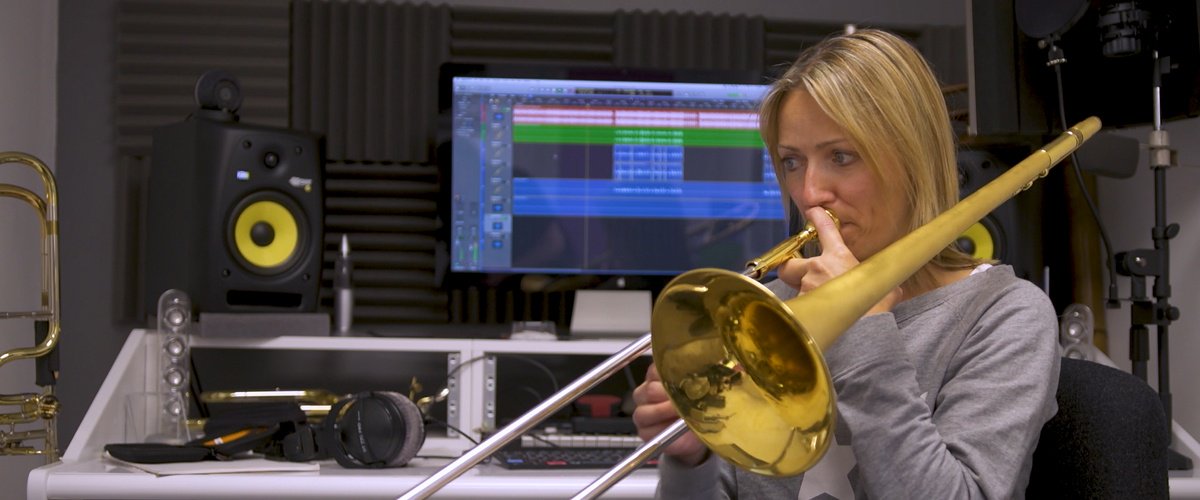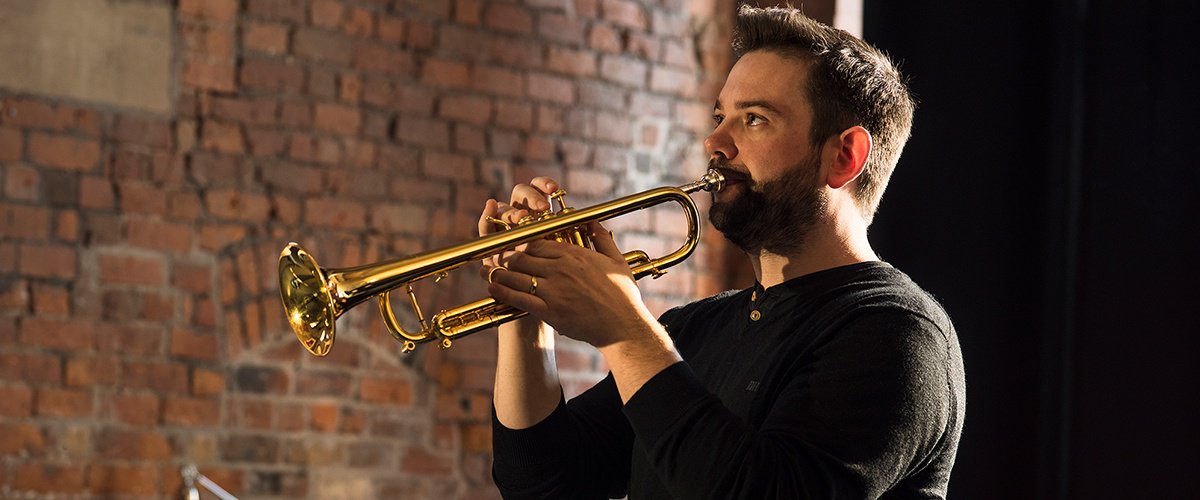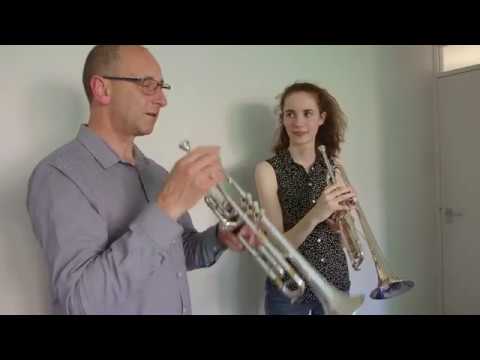Brass Pathways Q&A: Mark Eager, Trombone
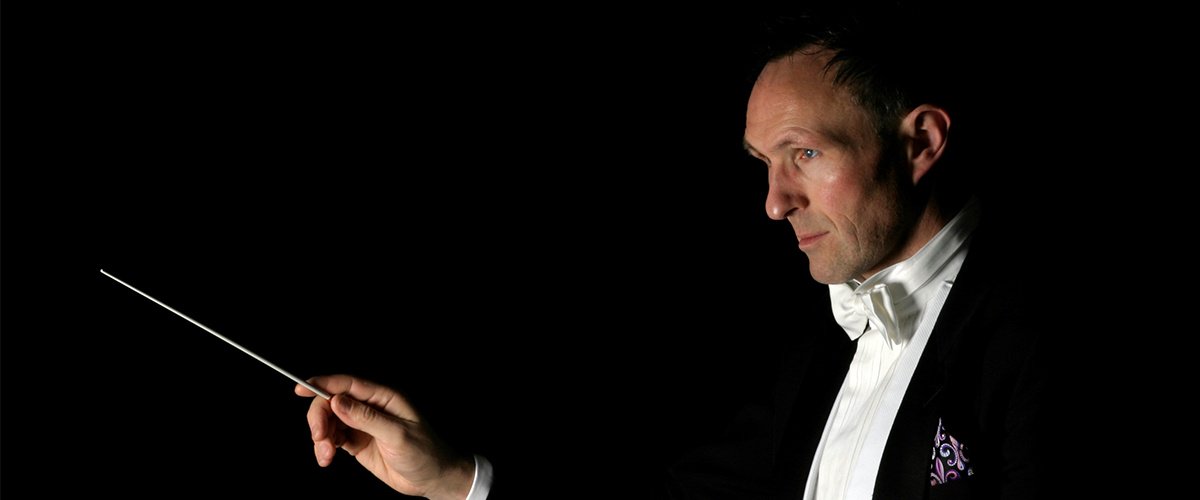
Mark Eager is a world-class trombone player; Soloist and Principal Trombone with the BBC National Orchestra of Wales from 1993 to 2006. During this time Mark played the world premieres of concerti by Françaix, Pickard and Hoddinott for BBC Radio 3 and accumulated a vast recording portfolio in radio, TV, film and CD. Also a conductor, Mark is Principal Conductor and Artistic Director of The Welsh Sinfonia. Mark is dedicated to working with young people, and as Principal Conductor of the Cardiff University Symphony Orchestra, he constantly enjoys the thrill of inspiring young musicians. In March 2017 the University of Bolton awarded Mark an Honorary Doctorate for services to music & performance.
To get a taste of what life as a professional brass player can be like, we caught up with Mark and asked him some questions about his career as a performing trombonist.
Can you tell us a bit about your career to date?

I started my second conducting career in 2006 and have enjoyed much success with The Welsh Sinfonia and Cardiff University Orchestra, as well as other orchestras worldwide. I commission and perform much new music and my CD recordings have enjoyed critical acclaim, most recently in The Times. Throughout my whole performing career I have had a passion for education, passing on the wealth of knowledge I have gained from so many great experiences through teaching and masterclasses.
What first inspired you to learn the trombone?
I was immersed in music from birth; my great-grandfather was reputed to have (and play) over 10 instruments in his small house, including a double bass, much to the annoyance of the rest of the family!! My grandparents played and sang, as did my parents and pretty much every family friend I knew. I therefore very much count music as my ‘first language’. The trombone came from my grandad who was a tiny chap but who played this amazing G trombone which was taller than him and for which he needed a handle to be able to reach the end of the slide. As a six/seven year old it was such fun, pushing the slide in and out blowing raspberries. Then as a young teenager I realised that if you took the slide off, it became an enormous pea shooter - great for shooting at unsuspecting players in my countless rests! On a serious note though, when I stood up and played in front of the whole assembly at junior school and was admired, even by the ‘big boys’, I enjoyed the feeling and wanted more.
What sort of education did you have on the trombone?
I had no formal lessons to begin with and achieved Grade 5 in that way. I think my parents then said: “OK you’ve got your Grade 5 now we’ll pay for some proper lessons”. I was then given six months by the teacher as he said I had to re-learn so much that it would be make or break. At the end of those six months I had learned a new clef and achieved Grade 6 with Distinction. I never really looked back and left the Royal Academy of Music in 1984 with their highest internal award, the Dip.RAM.
What made you want to turn learning the trombone into a career?
Two things: I was watching a TV programme in black and white and the Philip Jones Brass Ensemble came on. It was not what they played that captivated me but the fact that these people did this as a job! I just thought “WOW, seriously you can do that AS A JOB – I fancy some of that!”.
The other was a record of ‘The Planets’ that my father had, I loved ‘Mars’, especially the trombone parts. It was played by the BBC Symphony Orchestra, so that was my dream and goal set, I just had to make it happen.
How did you first get into the industry as a professional?
Whilst at music college I played in every concert I possibly could, which built all the important contacts and experience. Bit by bit I started working with some top, influential professionals who obviously liked what I did. I then started receiving invites from major orchestras and ensembles throughout the country. Also through audition, I was awarded a couple of ’trials’ with major orchestras which also got me noticed. Everything built from there.
What inspired you to follow the career path that you have?
I always enjoyed orchestral playing, as I think of myself much more as a ‘musician’ than as a ‘player’, if that makes sense. The fact that a lot of time was spent sitting around NOT playing didn’t bother me, as when the entry did finally come, it really meant something (eg Beethoven 5 - three movements waiting, but then bliss). I enjoyed the challenges entailed within that scenario. Whilst I enjoyed other styles of playing to an extent, I found the sheer quality and diversity of orchestral music, for me, could not be matched.
What have been your career highlights so far?
In a career that has so far spanned 34 years, there are many as you can imagine, but the BBC commissioning concertos for me was definitely a special joy, as the trombone is so rarely used as a solo instrument in orchestral concerts. I played the world premieres of ‘The Spindle of Necessity’ by John Pickard and ‘Concerto’ by Alun Hoddinott live on BBC Radio 3, to name but two. The International Trombone Association then featured me in their magazine, which included a CD of four concerti that I recorded with BBCNOW, to their worldwide members.
Conducting two world premieres, by major British composers David Matthews and Roxanna Panufnik, in one concert at the Cheltenham Music Festival with The Welsh Sinfonia, and leading a ground-breaking tour to China with the Cardiff University Symphony Orchestra are very recent highlights.
Being awarded a Doctorate by the University of Bolton for my “outstanding contribution to music and performance”, in a way sums things up…
What do you love most about what you do?
The sheer joy of making a page of inanimate black and white dots come alive and communicating with people, whether as a player or on a more expansive scale as a conductor.
What do you think are the most important skills needed by a trombone player, and when working as part of an orchestra?
The most important things we have as musicians are our ears! All high-level professionals working in the playing industry have great aural ability, so to become a skilled trombone player, honing the aural skills is a must. This crosses over into playing in an orchestra - listening to everyone and everything around you is vital to be able to fit the trombone part into the larger structure. Having a great rhythmic facility and understanding is a must too.
As regards the practical side, the understanding of breathing technique, air flow and support which leads to superb intonation and tonal focus are very important. Tone can be variable and liked or disliked subjectively; playing ‘in tune’, however, is not subjective and is arguably the number one skill needed to play with others.
What advice would you give someone learning the trombone?
That would take me a book to answer, however I would say listen as much as you can to great music and musicians on every instrument and don’t become limited in your outlook. Think of yourself as a musician who happens to speak through the medium of the trombone. At a more beginners’ level, follow your teacher’s instruction diligently and work on the basics – after all, concertos are just the basics put together in a more complex format!
What advice would you give to someone looking to make it as a professional in the industry?
Be realistic and ask these questions: Are you a musician through and through? If you even THINK of doing something else, then do that instead! Do you have great ears? Is your rhythmic ability and understanding faultless? Can you read music like you read a book? If all those answers are positive and that is backed up by your teachers, then remember it’s a job someone has to do, so why not you?
What are you currently involved with?
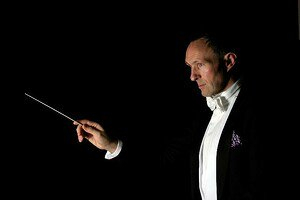
Another particularly important ongoing project is my Crescendo Project, which I instigated with the Welsh Sinfonia a few years ago. It is a five year schools project where I take an 18 piece professional orchestra in to mainly disadvantaged schools, to play with, play to and mentor the students to help form their own school orchestra. It has been such a success in Wales that I’m looking to bring it London in the near future.
